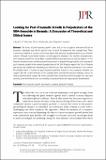Files in this item
Looking for post-traumatic growth in perpetrators of the 1994 genocide in Rwanda : a discussion of theoretical and ethical issues
Item metadata
| dc.contributor.author | Blackie, Laura E. R. | |
| dc.contributor.author | Hitchcott, Nicki | |
| dc.contributor.author | Joseph, Stephen | |
| dc.date.accessioned | 2017-12-13T12:30:13Z | |
| dc.date.available | 2017-12-13T12:30:13Z | |
| dc.date.issued | 2017-12-12 | |
| dc.identifier | 249278076 | |
| dc.identifier | 0c08ffa2-0b14-4778-8794-1d7b3792e449 | |
| dc.identifier.citation | Blackie , L E R , Hitchcott , N & Joseph , S 2017 , ' Looking for post-traumatic growth in perpetrators of the 1994 genocide in Rwanda : a discussion of theoretical and ethical issues ' , Journal of Perpetrator Research , vol. 1 , no. 1 , pp. 64-84 . https://doi.org/10.21039/jpr.v1i1.39 | en |
| dc.identifier.uri | https://hdl.handle.net/10023/12325 | |
| dc.description | This publication was made possible through the support of a grant AH/M004155/2 from the Arts and Humanities Research Council. | en |
| dc.description.abstract | The theory of post-traumatic growth claims that, in the struggle to overcome difficult experiences, individuals may identify positive ways in which the experience has changed them. There is extensive evidence of survivors of extreme adversities reporting the phenomenon across different cultures. Although reconciliation involves facilitating positive changes in the identities of perpetrators, post-traumatic growth has not yet been studied in relation to perpetrators of political violence. In this theoretical review article, we draw upon existing research to evaluate the applicability of the concept of post-traumatic growth in the context of perpetrators of the 1994 Genocide against the Tutsi in Rwanda and discuss the unaddressed theoretical and ethical issues that need to be considered in this context. We conclude that it is feasible for post-traumatic growth to manifest in this population. However, we suggest that the current definition of this concept needs considerable revision including a focus on measuring behavioural change. We further conclude that researchers need to navigate this topic very carefully, given the ethical issues surrounding misrepresentation and inappropriate dissemination. | |
| dc.format.extent | 180548 | |
| dc.language.iso | eng | |
| dc.relation.ispartof | Journal of Perpetrator Research | en |
| dc.subject | Post-traumatic growth | en |
| dc.subject | Perpetrators | en |
| dc.subject | Violence | en |
| dc.subject | Genocide | en |
| dc.subject | Rwanda | en |
| dc.subject | DT Africa | en |
| dc.subject | T-NDAS | en |
| dc.subject | SDG 16 - Peace, Justice and Strong Institutions | en |
| dc.subject.lcc | DT | en |
| dc.title | Looking for post-traumatic growth in perpetrators of the 1994 genocide in Rwanda : a discussion of theoretical and ethical issues | en |
| dc.type | Journal article | en |
| dc.contributor.sponsor | Arts and Humanities Research Council | en |
| dc.contributor.institution | University of St Andrews. French | en |
| dc.identifier.doi | https://doi.org/10.21039/jpr.v1i1.39 | |
| dc.description.status | Peer reviewed | en |
| dc.identifier.grantnumber | AH/M004155/2 | en |
This item appears in the following Collection(s)
Items in the St Andrews Research Repository are protected by copyright, with all rights reserved, unless otherwise indicated.

